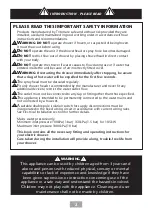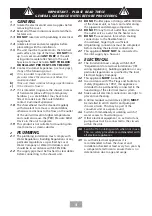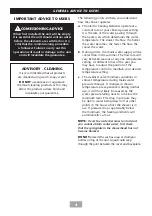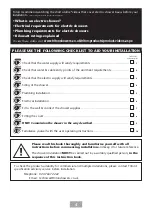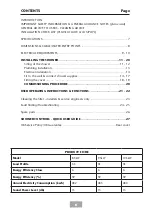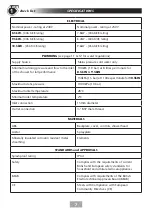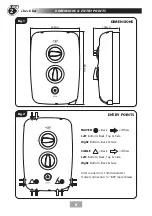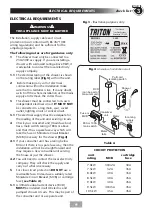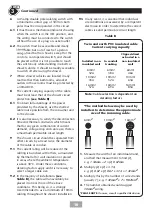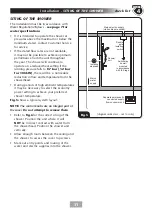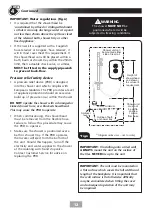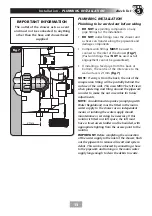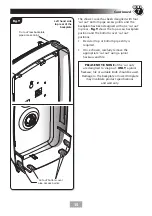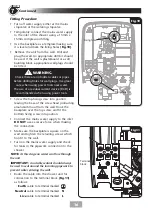
10
Continued
Table B
Note:
Cable selection is dependent on
derating factors
Twin and earth PVC insulated cable
Current carrying capacity
In conduit
trunking
6mm²
38A
10mm²
52A
16mm²
69A
Installed in an
insulated wall
6mm²
32A
10mm²
43A
16mm²
57A
Clipped direct
or buried in a
non-insulated
wall
6mm²
46A
10mm²
63A
16mm²
85A
6mm2
10mm2
16mm2
*The method below may be used by
installers to determine the approximate
size of the incoming cable.
1.
Measure the width of an individual strand,
and half that measurment to find
(r)
,
e.g:
1.34mm ÷ 2 = (r) 0.67mm
2.
Multiply
(r) x (r)
x
3.14,
e.g:
(r)
0.67 x (r)
0.67
x
3.14 = 1.41mm2
3.
Multiply this by the number of wire strands
(usually 7), e.g:
1.41mm2 x 7 = 9.87mm2.
4.
The number obtained would suggest
10mm2
wiring.
*PLEASE NOTE:
If unsure, consult a qualified Electrician.
6
A 45 amp double pole isolating switch with
a minimum contact gap of 3mm in both
poles must be incorporated in the circuit.
6.1
It must have a mechanical indicator showing
when the switch is in the OFF position, and
the wiring must be connected to the switch
without the use of a plug or socket outlet.
6.2
The switch must be accessible and clearly
able, but out of reach of a person
u
xed bath or shower, except for the
cord of a cord operated switch, and should
be placed so that it is not possible to touch
the switch body while standing in a bath or
shower cubicle. It should be readily accessible
to switch off after using the shower.
7
Where shower cubicles are located in any
rooms other than bathrooms, all socket
outlets in those rooms must be protected by
a 30mA RCD.
8
The current carrying capacity of the cable
must be at least that of the shower circuit
protection
(see Table B)
.
8.1
To obtain full advantage of the power
provided by the shower, use the shortest
cable route possible from the consumer unit
to the shower.
8.2
It is also necessary to satisfy the disconnection
time and thermal constraints which means
that for any given combination of current
demand, voltage drop and cable size, there is
a maximum permissible circuit length.
9
The shower circuit should be separated from
other circuits by at least twice the diameter
of the cable or conduit.
9.1
The current rating will be reduced if the
cabling is bunched with others, surrounded
by thermal loft or wall insulation or placed
in areas where the ambient temperature
is above 30°C. Under these conditions,
derating factors apply and it is necessary to
select a larger cable size.
9.2
In the majority of installations
(see
Table B)
, the cable will unavoidably be
placed in one or more of the above
conditions. This being so, it is strongly
recommended to use a minimum of 10mm
cabling throughout the shower installation.
9.3
In any event, it is essential that individual
site conditions are assessed by a competent
electrician in order to determine the correct
cable size and permissible circuit length.
3
SECTION
SECTION


